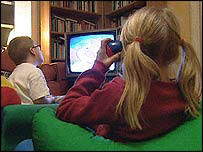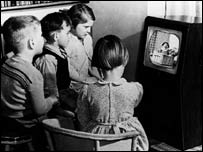
Nickerie.Net, maandag 19 februari 2007
Wetenschapper: tv-verbod voor kinderen
Er moet een televisiekijkverbod komen voor kinderen tot drie jaar. Hiervoor pleit wetenschapper Aric Sigman in het vaktijdschrift Biologist. Ook vindt Sigman dat jongeren slechts mondjesmaat mogen kijken wanneer ze opgroeien. Volgens de onderzoeker is tv-kijken slecht voor de gezondheid van kinderen.
Het gaat niet alleen om de inhoud van programma's, maar het kijken naar het beeldscherm veroorzaakt ook problemen. Zo zou het bijziendheid, corpulentie, diabetes, slaapproblemen en autisme tot gevolg kunnen hebben.
BBC-news (19-2-2007):
TV daily limit call 'unrealistic'
A call for imposed recommended daily allowances on television is unworkable and unrealistic, say experts. Dr Aric Sigman, of the British Psychological Society, proposed limits after looking at published studies on potential health risks of TV viewing. He says children under three should be banned from watching any TV, and older children restricted to viewing an hour a day of good quality programmes. Teens should be limited to one and a half hours, and adults two hours a day. There's nothing to be lost by watching less TV but a great deal to be lost by continuing to watch as much as we do Dr Aric Sigman
 |
| About half of children now have a TV set in their bedrooms |
Dr Sigman says most of the adverse health affects documented as linked with TV viewing - ranging from "telly belly" obesity to Alzheimer's disease - occur irrespective of the type of programme people watch and are related to duration of viewing.
At age 75, the average British person will have spent more than twelve years of full 24-hour days watching television, he said. The average six-year-old will have already watched more than one full year of their lives, he says. When other 'screen time' is included the figure is far higher.
TV Nation
Children aged 11 to 15 now spend 53 hours a week - seven and a half hours a day watching TV and computers, an increase of 40 per cent in a decade. About half of children now have a TV set in their bedrooms, research suggests. It would be unrealistic to have limits such as this. Common sense should prevail Dr David Haslam of the National Obesity Forum
 |
| About half of children now have a TV set in their bedrooms |
Dr Sigman believes this is too much and, therefore, needs to be regulated. "Perhaps because television isn't a substance or a visibly risky activity, it has eluded the value judgements that have befallen other health issues. "Yet it is particularly disturbing to still hear some academics urging 'caution in interpreting these studies' and warning of the risk of over-reacting." He said enough evidence now existed to say 'better safe than sorry'.
"There is simply too much at stake not to be responsibly decisive now. In short, there's nothing to be lost by watching less television but a great deal to be lost by continuing to watch as much as we do."
An average 75-year-old will have spent 12 of their years watching TV. However, some argue that TV viewing can aid learning and improve health. For example, research has suggested that it can aid speech and language development in children. Educational programmes can also raise awareness of important health issues. Doctors are also beginning to use interactive TV as a way to consult with patients who might not be able to travel to the surgery or hospital to be seen.
|
HEALTH ISSUES LINKED TO TV VIEWING |
|
NEGATIVE
POSITIVE
|
Dr David Haslam of the National Obesity Forum said that although TV viewing had been linked with obesity, it was leading a sedentary lifestyle that was the root cause rather than watching TV per se. Someone who watches more than two hours of TV per night might still be very active during the day for example. Equally, some people watch TV while exercising in the gym.
Dr Haslam said: "Watching too much TV is one of the many, many factors that causes ill health. But it would be unrealistic to have limits such as this. It does not reflect real life at all.
"It's like a bag of crisps - the occasional one is fine as long as you are not having them every day all day. "Common sense should prevail."
Dr Kevin Browne, from the University of Birmingham, has studied the impact of watching violence on TV on child behaviour. He said the critical thing for parents to be aware of was the circumstances in which their children watch TV. He said it was bad if a child watched TV on their own, unsupervised, for hours on end. "What we need to be weary about is watching TV in isolation.
"TV where it is used as a focus for discussion amongst peers or to promote parent-child interaction can be a positive thing." Last year, the National Literacy Trust commissioned a research review to investigate concerns that television might have a negative impact on language learning among children.
The research suggested that in the right circumstances, TV viewing among 2-5 year olds could be beneficial to language development.
|
Bron/Copyright: |
|
|
Nickerie.Net/ rtl4 |
,19-02-2007 |
|
|
E-mail: info@nickerie.net
Copyright © 2007. All rights reserved.
Designed by Galactica's Graphics